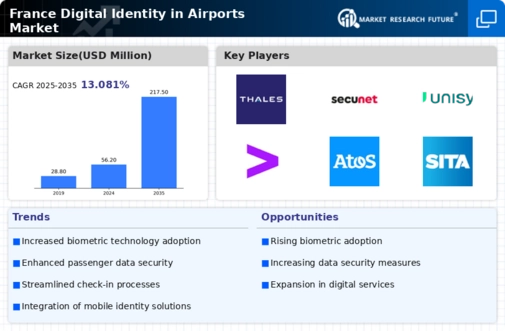Increasing Passenger Volume and Traffic
The digital identity-in-airports market is also influenced by the increasing passenger volume and traffic in France. As air travel continues to rise, airports are faced with the challenge of managing larger crowds efficiently. The implementation of digital identity solutions is seen as a viable strategy to handle this influx. For example, airports that have adopted biometric boarding systems report a 20% increase in processing speed during peak travel times. This efficiency not only enhances the passenger experience but also optimizes airport operations. Consequently, the growing number of travelers is likely to propel the demand for digital identity technologies, as airports strive to maintain smooth operations amidst rising traffic.
Focus on Passenger Experience and Convenience
The digital identity-in-airports market is increasingly focused on enhancing passenger experience and convenience. Airports are recognizing that streamlined processes can significantly improve traveler satisfaction. Digital identity solutions, such as mobile boarding passes and automated check-in kiosks, are being implemented to reduce friction in the travel experience. Recent surveys indicate that 75% of travelers prefer contactless solutions that expedite their journey through the airport. This growing preference is driving airports to adopt digital identity technologies that prioritize convenience, thereby fostering a more positive travel experience. As passenger expectations evolve, the market is likely to see continued investment in innovative identity solutions.
Growing Demand for Enhanced Security Measures
The digital identity-in-airports market in France is experiencing a notable surge in demand for enhanced security measures. With increasing concerns regarding passenger safety and the potential for security breaches, airports are investing in advanced digital identity solutions. These technologies, including biometric verification and facial recognition, are designed to streamline the identification process while ensuring a high level of security. According to recent data, the implementation of biometric systems has been shown to reduce wait times by up to 30%, thereby improving the overall passenger experience. This growing emphasis on security is likely to drive the adoption of digital identity solutions, as stakeholders seek to protect both travelers and airport infrastructure.
Government Initiatives for Digital Transformation
Government initiatives aimed at digital transformation are significantly impacting the digital identity-in-airports market in France. The French government has been actively promoting the adoption of digital technologies across various sectors, including transportation. This support includes funding for research and development of digital identity solutions, as well as regulatory frameworks that facilitate their implementation. Such initiatives are expected to foster innovation and encourage airports to invest in modern identity verification systems. As a result, the market is likely to benefit from increased public and private sector collaboration, leading to the development of more robust digital identity infrastructures in airports.
Technological Advancements in Identity Verification
Technological advancements are playing a pivotal role in shaping the digital identity-in-airports market in France. Innovations in artificial intelligence and machine learning are enhancing the capabilities of identity verification systems, making them more efficient and reliable. For instance, the integration of AI-driven analytics allows for real-time monitoring and assessment of passenger data, which can significantly reduce the risk of identity fraud. As airports increasingly adopt these cutting-edge technologies, the market is projected to grow at a compound annual growth rate (CAGR) of approximately 15% over the next five years. This trend indicates a strong shift towards more sophisticated identity management solutions within the airport environment.
















